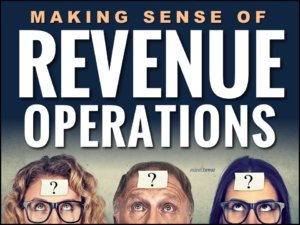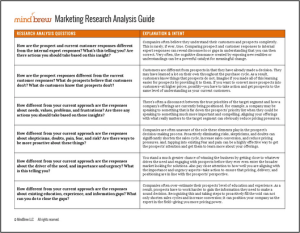In response to a number of questions through the Help Desk, we did some more focused research on the topic of “revenue operations.” And after combing through a lot of articles and white papers and talking with both practitioners and consultants alike, we conducted a training session to share what we’d learned with our subscribers and hopefully, clear up some confusion.
In “Making Sense of Revenue Operations,” we explore the core ideas behind the revenue operations concept and discuss many of the practical implications and applications. We also compare and contrast the “revenue operations” construct with both the traditional concept of sales ops as well as the concept of “strategic sales ops” that we’ve been exposing in the Playbook for over a decade.
But while the “revenue operations” and “strategic sales ops” concepts are almost identical in focus, scope, and application, there is a certain appeal to the “Revenue Operations” label. After all, there is some heightened interest and energy surrounding this relatively new concept. And it can also be argued that these terms are better at conveying a broader focus without having to redefine existing terms in other peoples’ minds.
As such, some subscribers asked if it might be a good idea to forgo a Sales Ops title and adopt the Revenue Operations moniker instead.
Now, as we highlight in the session, this might make some sense for a brand new function where there are fewer preconceptions and existing norms. But for a well-established Sales Ops group, a wholesale name change like this might actually generate more internal head scratching, eye rolling, and confusion than it’s worth.
That said, however, there is a very effective strategy that allows more established Sales Ops groups to leverage this new and interesting revenue operations concept to a much greater extent than a name change ever could:
An established Sales Ops group can create and manage a Revenue Operations Center of Excellence.
As we’ve discussed elsewhere in the Playbook, the Center of Excellence model is great for facilitating ongoing collaboration and coordination between various internal contributors who may not otherwise have formal reporting relationships.
In the context of strategic sales operations or revenue operations, there are many critical players outside of the formal sales function—product management, marketing communications, IT/IS, customer service, operations, etc. All of these players can have dramatic impacts on sales and revenues, yet they typically operate within independent, uncoordinated silos. Through a CoE, the relevant contributors are brought together in a dotted-line structure so that they can coordinate their ongoing efforts toward improved overall performance.
So no matter what we choose to call it, a Center of Excellence can be a very effective structure for pursuing the broader, more strategic aspects of in-market sales performance. And in organizations where the other contributing silos tend to be very defensive and protective of what they perceive to be their “turf,” a Center of Excellence can be a much easier pill for others to swallow.
Now, when we couple the Center of Excellence structure with the Revenue Operations concept, we just might be approaching the best of all worlds…
By creating and managing a Revenue Operations Center of Excellence, we can leverage this appealing new label that readily conveys the broader focus we’re embracing, using an organizational approach that’s both effective and relatively easy for others to accept, while sticking with our existing Sales Ops functional titles and avoiding any confusion or conflict a change at that level might cause.
We don’t have to choose between Sales Ops or Revenue Ops. That’s a false choice. With the right approach, we can actually leverage both to great effect.














